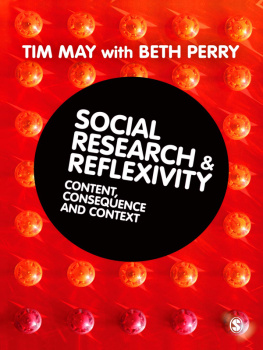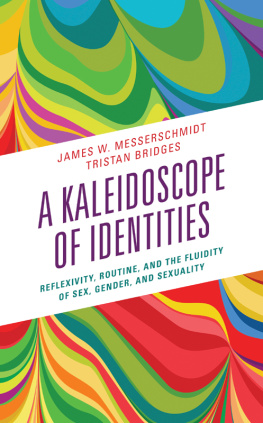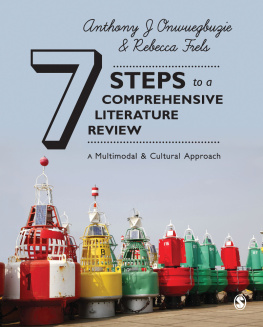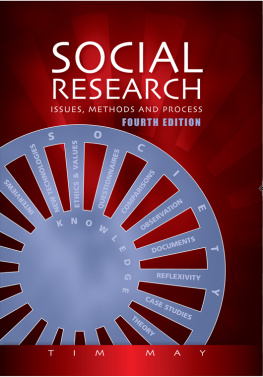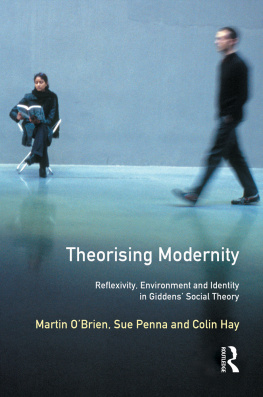SOCIAL RESEARCH & REFLEXIVITY
SAGE has been part of the global academic community since 1965, supporting high quality research and learning that transforms society and our understanding of individuals, groups, and cultures. SAGE is the independent, innovative, natural home for authors, editors and societies who share our commitment and passion for the social sciences.
Find out more at: www.sagepublications.com
Tim May 2011
and Conclusion Beth Perry 2011
Apart from any fair dealing for the purposes of research or private study, or criticism or review, as permitted under the Copyright, Designs and Patents Act, 1988, this publication may be reproduced, stored or transmitted in any form, or by any means, only with the prior permission in writing of the publishers, or in the case of reprographic reproduction, in accordance with the terms of licences issued by the Copyright Licensing Agency. Enquiries concerning reproduction outside those terms should be sent to the publishers.
SAGE Publications Ltd
1 Olivers Yard
55 City Road
London EC1Y 1SP
SAGE Publications Inc.
2455 Teller Road
Thousand Oaks, California 91320
SAGE Publications India Pvt Ltd
B 1/I 1 Mohan Cooperative Industrial Area
Mathura Road
New Delhi 110 044
SAGE Publications Asia-Pacific Pte Ltd
33 Pekin Street #02-01
Far East Square
Singapore 048763
Library of Congress Control Number 2010922362
British Library Cataloguing in Publication data
A catalogue record for this book is available from the British Library
ISBN 978-0-7619-6283-0
ISBN 978-0-7619-6284-7 (pbk)
Typeset by C&M Digitals (P) Ltd, Chennai, India
Printed in India at Replika Press Pvt Ltd
Printed on paper from sustainable resources
PREFACE
As with the writing of all books, there are sets of circumstances that both enable and constrain their production. What is often needed is a systematic period of time to devote to its production. In my case, this was never to appear as my career took on new challenges in different contexts. While I sought the time, the effort bargain surrounding my work altered and the need to generate large amounts of external income and develop and then maintain an organization, its values, integrity and culture, predominated.
The processes that surround what we do inevitably influence our production at some level and given this, periods of time were taken within my daily practices to write this book. In the end, it was the context and content of those practices and the learning, knowledge and experiences that it generated that has informed the writing of this book. I found myself surrounded by varying expectations and entering into new terrains of activity. Then, in 2001, an opportunity arose to be seconded to the Centre for Sustainable Urban and Regional Futures (SURF). SURF is an interdisciplinary, largely self-funded research centre with its own offices in Central Manchester.
After a few months of my secondment I was asked to run the centre and we set about building it up and obtaining the necessary funding to provide for its reputation and ensure its medium term sustainability. It was hard work. Yet the chance to do something different increased and this experience has taught me a great deal. It was certainly not the same as my past experiences of academic life.
I had to learn about new areas of work and engage in the creation of a distinctive identity that sought to balance applicability with credibility. All of this took place whilst liaising with external clients, working to tight deadlines and producing lengthy research reports in short time periods, whilst actively seeking in our practice to adhere to a set of values concerning the importance of academic work. We sought clarification through journal articles and book chapters as a matter of routine and were highly successful in the game called the research assessment exercise. We designed websites, engaged in dissemination activities according to the idea of knowledge being a public good and sought to balance the attraction of expertise with a cooperative spirit of inquiry. Our own culture of inquiry, therefore, was of key importance to maintaining a sense of value in an ambivalent world.
In many ways I returned to elements of what I was an agricultural engineer before I became a social scientist, but with new forms of knowledge, values and experiences. When people speak of those in the public sector having no experience of the private sector and with that the assumption that they are somehow lacking I feel no need to be defensive or deferential. I actually find the tendency to be deferential to those in the private sector to be without foundation and this detracts from the important need to sustain the difference and distinctiveness of universities as sites of knowledge production, cooperation and dissemination.
We are engaged, as a matter of the realities that inform our everyday work, with clients in the public and private sectors who find what we do useful and challenging. That means we have to work at being different in both the university sector and in public and commercial life in general. We have to make spaces of reflection in places of expectation. This is important for the future of university life, but it receives little systematic attention and is frequently divorced from the content of academic work.
All in all, a great deal of change has taken place in a short period of time in my public and private lives. Throughout this period I have had the support of my friends at SURF where Vicky Simpson acts as our Centre Manager. Simon Marvin and I have been through many discussions and experiences in running SURF together. I have valued our friendship during this time and during one long evening, he gave me advice that I will never forget. Mike Hodson not only has been a friend and someone with whom I have enjoyed many good discussions over the years, but he also read parts of the book and provided valuable comments on its content.
Calum and Cian, my children, are often scathing about my endeavours and their friends have picked up books and asked: What is this all about? The reply is usually: I dont know, ask my Dad. They know I think the content may matter because we have talked about how knowledge can make a difference. What has made a difference to me, however, is being with them as they grow up and having an increasing feeling of well-being for the type of people that they are becoming and feeling very proud of who they are. Vikki Baker has provided inspiration and support during the process of writing, as well as reading chapters and providing valued advice. Thanks Vikki, not only for this, but for so much more in our lives together.
There are many friends and colleagues that I wish to mention who have influenced the content of this book in different ways. Malcolm Williams and I have worked on a number of projects and enjoyed numerous discussions about methodology, theory and philosophy of science and he has provided valuable feedback on the content of the book. Ken Parsons and I did our PhDs together and have remained good friends since that time. My thanks to you Ken for your support and our many memorable meetings over the years. There are also those who have been generally supportive of my endeavours and I wish to record my thanks to them. They are: Jason Powell, Linda McKie, Paul Taylor, Zygmunt Bauman, Richard Brown, Alan Bryman, Rom Harr, William Outhwaite, Bev Skeggs and Dorothy Smith.



